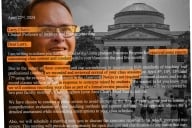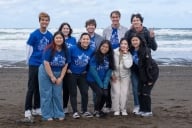You have /5 articles left.
Sign up for a free account or log in.
Clinical researchers taking money from industry has become standard practice, but what about climate researchers?
Last week, news reports surfaced that Patrick J. Michaels, a research professor of environmental sciences at the University of Virginia, and Virginia’s state climatologist, is receiving money from coal-burning utility companies pleased with his public skepticism about global warming.
According to news reports, Michaels told a group of business leaders that he needed more money to continue his research challenging global warming.
In a letter dated July 17, the Intermountain Rural Electric Association, an electric distribution cooperative, responded to Michaels’s fiscal crisis by sending a letter to fellow coal-burning utilities asking for money for the researcher, and espousing the importance of his work.
The letter, from Stanley R. Lewandowski, general manager of IREA, repeatedly mentions the need to respond to “An Inconvenient Truth,” Al Gore’s global warming film, and notes that some scientists, like Michaels, are skeptical about the forecasted climate change.
“Al Gore and others state that the scientific community has reached consensus,” the letter reads. “That is simply not true,” it continues, later adding that “we cannot allow the discussion to be monopolized by alarmists.”
The letter goes on to note that regulations seeking to curtail global warming, like a carbon tax, would be very expensive for companies that burn fossil fuels. “Although our preference would be for the issue to simply go away,” the letter says, “that is not going to happen.”
According to the letter, the Colorado based IREA has already given Michaels $100,000 this year, and at least another $50,000 has already been pledged.
Michaels said that he has no formal agreement with IREA, but that he functions as a "consultant," he said, alerting them about his take on the scientific merits of climate change research that shows up in peer-reviewed literature, and in the popular press. "Sometimes quotes [in news articles] are just dead wrong," he said. He said that some of the money will go to pay research assistants who help him comb through all the articles. Michaels added that, in the 1980s, he was skeptical that the Earth was warming at all. Now, he said, he believes there is warming, but that it is far less worrisome than other scientists make it out to be. Michaels noted that many researchers take private money for various reasons.
Clinical researchers frequently take money from drug companies to test new medicines. That practice, however, has come under growing scrutiny, and some scientists are uncomfortable with any corporate money funding science in a situation where the results are meaningful to the company funding the study.
Michael insists, though, that the industry money has nothing to do with his academic research, which is on hurricanes and heat-related mortality, and that is only for his role as a consultant.
Michael E. Mann, director of the Penn State Earth System Science Center and a faculty member in UVa’s department of environmental sciences until last year, said that “it seems clear to me there is a conflict of interest” in Michaels’s situation. “It is clear that the funder desires a particular finding, and that there is an implied understanding that continued funding is contingent on a positive outcome.”
Michaels, who was appointed to be the state climatologist by then-Gov. John N. Dalton in 1980, is cited in the mainstream news media far more often than in peer reviewed journals. Some critics said that he’s simply a mouthpiece for special interest, even while they acknowledge that industry money doesn’t always bias scientific work, and that funding sources can be a tricky grey area.
“If [Michaels] is functioning as a lobbyist, I don’t think where he gets his money is an ethical problem,” said Donald Kennedy, editor in chief of Science. “But he is posing as a scientist, and that is a problem.”
Michaels responded that Kennedy, editor of a journal published by the American Association for the Advancement of Science, is himself affiliated with a lobbying organization. "This is at least the pot calling the kettle brown," Michaels said.
Nicholas H. Steneck, a University of Michigan history professor and a consultant for the Office of Research Integrity at the U.S. Department of Health and Human Services, noted that, for example, researchers “get hired all the time to testify in trials. Where you run into problems is where somebody goes in and tries to say they’re an objective researcher, and maybe they’re a hired gun.”
Steneck added that the most important thing is for researchers to be honest about what they’re doing. With regard to his funding sources, Michaels has been honest. Michaels has been telling reporters for years that he has been receiving money from industry.
Gavin A. Schmidt, a climate scientist at the NASA Goddard Institute for Space Studies in New York, said that private money is relatively rare in climate research. “There are small amounts of money available from foundations … some enviro groups have commissioned reports on impacts in various regions,” he said. “However, none of this non-governmental money comes anywhere close to the amounts of money that the energy industry has made available to fund disinformation campaigns such as the one described in the IREA letter.”
Eric Steig, an associate professor of earth and space sciences at the University of Washington, said that environmental sciences are “grossly underfunded,” and that if “private parties wish to provide such funding, that is fine with me.” He added that, if “Pat Michaels deserves criticism, it is for the shoddiness of his work, not his funding sources.”








